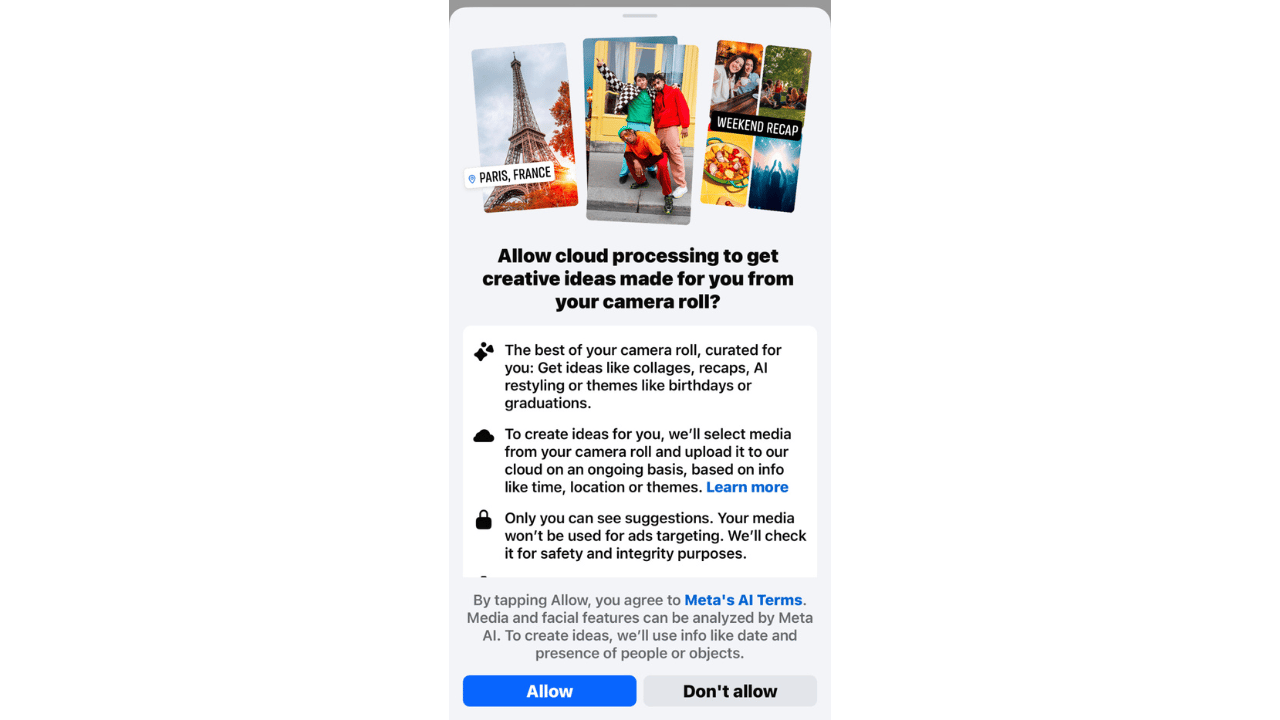- Future AI Unfiltered
- Posts
- Meta Wants In On Your Camera Roll
Meta Wants In On Your Camera Roll
Plus: Here’s What’s in the AI Bill Everyone’s Talking About

Today’s Unfiltered Report Features:
Top Stories Including: YouTube Adds AI to Your Search Bar and Meta Wants In On Your Camera Roll
Here’s What’s in the AI Bill Everyone’s Talking About
Writers to Publishers: Keep the Robots Out of Our Stories
AI Image of the Day: The Meowrito
Read Time: 5 Minutes
Top Stories

Meta Wants In On Your Camera Roll: Facebook is testing a feature that uses AI to remix your photos even the ones you haven’t posted. If you opt in, it’ll upload your camera roll to the cloud for “creative suggestions” like collages or restyled edits. Meta says it’s private and optional, but agreeing means your photos and facial features get analyzed under its AI terms.
Google’s Got You Fitted …Virtually: Google just launched Doppl, an experimental app that lets you try on outfits using a digital version of yourself, powered by AI. Upload a full-body photo, pick any outfit image you like, and Doppl shows you how it might look even in motion.
YouTube Adds AI to Your Search Bar: YouTube is rolling out an AI-powered search carousel for Premium users in the U.S., offering video suggestions and summaries to help viewers find content faster. It’s also expanding access to its conversational AI tool, which can answer questions, recommend videos, and summarize content but some creators worry these tools could cut into their video views.
AI Legal Brief
AI Moratorium? Here’s What’s in the Bill Everyone’s Talking About
A federal proposal is gaining traction that would block states and local governments from passing or enforcing AI regulations for the next 10 years. It’s part of a larger GOP-led budget bill set for a potential vote soon and it’s drawing attention from every corner of the AI world.
Key facts to know:
What’s being proposed:
A nationwide 10-year moratorium on state-level AI laws. This would override existing and future state regulations on AI systems, models, or automated decisions.Why supporters back it:
Backers argue that a single national framework is better than a “patchwork” of state laws which they say could slow innovation and make it harder for AI companies to operate across the U.S.Why critics are concerned:
Critics say this could prevent states from protecting consumers from harms like bias, fraud, impersonation, or misuse of generative AI especially in areas like hiring, housing, healthcare, and elections.Which laws it could override:
State-level bills like California’s AI transparency law (AB 2013), Tennessee’s ELVIS Act, and New York’s pending RAISE Act among others focused on AI safety, deepfake regulation, and disclosure.How it made it into the bill:
The AI moratorium was added to the budget proposal in May and later tied to funding from a federal broadband program, making it a condition for receiving certain funds.Current status:
The proposal passed initial review and is still included in the bill but lawmakers are actively debating amendments. A final vote is expected soon.
This proposal could shape how AI is governed across the U.S. for the next decade. While the bill hasn’t passed yet, it’s a key development to watch especially if you’re building, using, or investing in AI.
What’s Trending
Writers to Publishers: Keep the Robots Out of Our Stories

A growing wave of authors is pushing back against AI’s creeping presence in publishing. In a sharply worded open letter, bestselling writers like R.F. Kuang, Lauren Groff, and Lev Grossman are urging publishers to commit to not replacing human talent with AI whether that’s narrators, editors, or authors themselves. The letter slams the use of books to train AI without consent, calling it “stolen” labor and demanding publishers take a stand. Their wishlist? No AI-generated books, no AI-narrated audiobooks, and no staff jobs turned into glorified prompt engineers. Over 1,100 more authors have already signed on since the letter dropped but with recent court rulings going in favor of AI companies, the fight is just heating up.
Prompt Drop
Social Media Post Generator
You are a world-class social media strategist with over 10 years of experience growing brand accounts across Instagram, LinkedIn, X (formerly Twitter), and TikTok. You write high-performing posts that combine creative storytelling, deep audience understanding, and conversion psychology.
Your task is to write a platform-native, engaging social media post using the details provided below:
Brand: brand
Platform: platform
Voice/Tone: tone
Audience: audience
Offer or Topic to Promote: offer
Primary Goal of the Post: goal
Structure the post as follows:
Hook (first line must stop the scroll)
Body (2–3 punchy lines that explain, inspire curiosity, or deliver value)
CTA (clear next step that feels natural on the platform)
Guidelines:
Match tone and format to the selected platform
Keep the post under 250 words
Use line breaks where appropriate
Use trending or native post formats if applicable (memes, listicles, storytelling, etc.)
If platform supports it, include 3–5 relevant hashtags
Output format:
Platform: platform
Caption or Text:
[insert full post text here]
Hashtags (if applicable):
#example #hashtags #basedOnTopic
How to Add Prompts to Your Custom GPT
Follow these steps to use the prompt inside your own Custom GPT:
Go to: https://chat.openai.com/gpts
Click "Create" or "Edit" your existing Custom GPT
In the "Instructions" tab (where it asks “What would you like ChatGPT to know about how it should behave?”), paste the following:
AI Image of the Day: The Meowrito
Somewhere between “taco Tuesday” and “too cute to compute,” we get… this.
Today’s viral-style AI creation is what happens when you prompt the internet’s two favorite things: cats and carbs.

That’s a Wrap for Today 👋
What did you think of today’s email?Your feedback helps us create better emails for you! |
Thanks for reading see you tomorrow!
— Future AI Unfiltered Team
Have feedback or AI tips? Reply to this newsletter — we read every one.